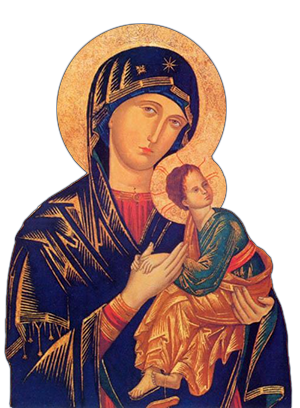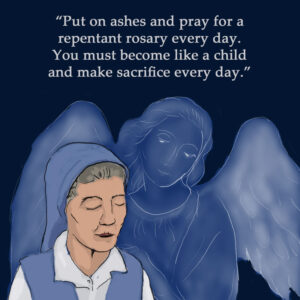Father Mitch Pacwa's homily for December 9th
Today we celebrate that the Lord chose Juan Diego a native American and Native Mexican in those days. And he was chosen contrary to any of his own desires or interest to see the Blessed Mother.
One of the important things is that it was a miraculous experience where the image of the Blessed Mother appeared on his simple tilma, made out of a yucca plant; something that could easily disintegrate. These were temporary kind of clothes, you could change fashion quickly because they wear out so fast. That is the way things were. It is still with us. It has not decayed. It is miraculously present, with all kinds of wonders about it.
But we celebrate the feast of Our Lady of Guadalupe and we will talk about that in a few days. It is important to note that Juan Diego was already a convert. He had already become a Christian–one of the few. He was someone that lived among the three C’s of Catholicism: you have your Cradle Catholic, your Convert Catholic and your Cafeteria Catholic–and he had all three around him. And he was obviously the second type: a convert.
He was very devoted. Not only devoted in terms of his piety but was very concerned when he saw Our Lady, he was actually going to see a sick relative–I believe his uncle–and he is trying to do an act of charity. And he didn’t want to deal with Our Lady at that point because he said, I have to take care of him. But he was someone who did that kind of care for those who are in need. He was someone who lived out his Catholic piety and he was also someone who, as he went on, taught Catechism to the people around him. And he integrated this Catholic faith as a convert.
On the other hand, a lot of us, most of us here I assume, are Cradle Catholics. And we spend our lifetime trying to imitate the lord, to follow this faith, integrate the things we believe, the morality of our faith and so on. This is part of dealing with the results of original sin and growing in faith and learning beyond our present ignorance–these are the things we all do.
But he also had to deal with a lot of Cafeteria Catholics; those who chose some parts of Catholicism, but did not take the other part seriously. Often, the Spanish conquistadors would be willing to fight for their faith but they were not always so willing to live the full ramifications of their faith, and were quite happy to do to the Native Americans what they had been doing to each other, namely, enslaving them and forcing them to labor and taking their stuff, especially their gold and silver which they thought was useful for Europe. That kind of Cafeteria Catholicism exists today.
Given when we look at the Apostles themselves, especially before Easter, before Pentecost, they would pick and choose from among Our Lord’s teachings. Some of them they liked and some of them they did not. And we see in the anvil of Holy Thursday that not many of them did well in the face of temptation–none of them, in fact.
So this problem of having people pick and choose what they want is in the past and still with us. And we have to be alert. Which of those letter C’s are we going to be? The Cradle Catholic that continues to struggle to integrate the faith, the Convert who takes this on with another kind of adult acceptance and grows into the faith–with their own struggles to be sure, or the cafeteria Catholic who wants comfort and finds the faith comforting when they need it but when it is inconvenient they ignore its teachings.
These are the choices that we still see today. Often what we are experiencing today is, in addition to that, those dynamics inside the Church, outside of the Church we have the Cancel Culture. A lot of times we see in this country that those who were missionaries among Native Americans and Native Mexicans, are hated and disregarded. Their statues are torn down. We have seen the statues of Junipero Serra torn down. And there will be others–we will see more of this, because one of the goals of so many of these folks in their desire to change society is that they have to get rid of true history; it is always mixed, because people are mixed–people like I just described–the Church as including the 3 C’s–there’s a mixture in all of history, all of secular society.
And the need to purge is exactly what Lenin used to do, purging the Christian faith from Russia. Stalin would do it not only to the Christian church, but he also did it to the Communist Party. Our own intelligence agencies, in the early part of the 20th century, could tell which Communist officials had been shot by the fact of new pictures, new photographs of the Communist leaders would have them erased. Because Cancel Culture is inherent in Socialism and Marxism. They have to eliminate because they are creating a new vision. The need to eliminate the relationship of the Church with Native Americans and with people around the world has to be eliminated because it is also a mixed history to be sure, and it is important for us to note no matter what they do, no matter how they try to eliminate or cancel parts of culture we will always recognize the sanctification of Native Americans, like Juan Diego, and Kateri Tekawitha, and now the case for Black Elk is being moved forward–he himself became a great catechist and lived out the Catholic faith very richly. And also the canonization and sanctification of those who were killed by Native Americans as martyrs–all of this.
I am sure that the North American martyrs and martyrs all around the United States and the Americas would embrace every single one of the Native Americans, but they would never cancel out; they would never say to God, “you have to keep these people out.” No.
Just like we often portray St. Stephen and St. Paul embracing each other when Paul finally arrived to heaven after his martyrdom; that Christ is able to reconcile, not cancel. Christianity is a reconciliation culture, not a cancellation culture. And we integrate the reality of sinners inside of the Church and outside of the Church and everywhere else; we pull that together. We recognize the holiness wherever it exists and we recognize the sin.
It is important to note: it was the Apostles who made sure that the stories of their own failures in faith in Jesus were put into the Gospels. This was not a CNN doing a great investigation to discover all these Apostles were really terrible to Jesus. No, they put it there themselves. As people like all of us, other priests have heard confessions and gone to confession, the Apostles would be aware of their own sinfulness before God and put it into the Bible. And the Church has continued that.
All of the bad stuff that we know about, nasty people in the history of the Church, all of that was preserved by the Church–this is something that the Church wrote down, including when people in the Church mistreated Native Americans, Native Mexicans and native South Americans–the Church included that. The Church also condemned it. The same thing with the African slave trade. They condemned it. But also wrote down what people in the Church did in becoming involved in it.
So it is only by remembering the facts of history and doing not only our personal examination of conscience, but also our community examination of conscience that we then find reconciliation and healing. And the Cancel Culture is always a mistake. It comes back, it always comes back with the truth. But it makes those who do the cancellation look ever smaller in mind and tiny in heart because they cannot cope with their own failures, let alone everybody else’s. This is the reality. To see on the celebration of St. Juan Diego a recognition of the sanctity of this convert, as well as the problems of the Cafeteria Catholics around him as well as the commitment of Cradle Catholics who worked hard to bring about the sanctification of the Native Mexican population, and as a result of Juan Diego’s fidelity and of course by the grace of God, tens of millions of people in the Americas became Catholic due to his catechesis of living the faith as a convert. It is remarkable, remarkable, how many tens of millions became Catholic as a result. And we ourselves need to keep that in mind.
As far as the readings of today the focus is something that is also important for us at this particular time in our history. Notice how the Lord starts off by asserting that He is the creator of everything. He poses a rhetorical question, “to whom can you compare me as an equal? Look up at the stars. I created them.” And that he has the power and strength and he calls each of them by name. This section of Isaiah was written in Babylon. It was written among people who invented astrology because they believed that the planets were deities. They believed that the wind was a God. They believed that the storm was a God. They believed all these creatures were gods and he says, the Lord says to look at nature. “I created all of it.” In the Bible, this word ‘create,’ only God uses–only God uses that word, only God can create–nobody else. And then they say, but my way is hidden from you. You do not even notice me. I’m suffering in Babylon, in exile. He makes it clear, “I do not neglect. I was the one that gave you this punishment. And I have not forgotten; this is part of my plan of salvation.” Because as a result of this exile they finally got purified of worshiping other gods. Something Juan Diego would have known.
There were many deities, some of which were horrible, horrible deities that were being worshiped. One of the deities that was worshiped the most required people; required the Aztec priest to cut out the hearts of the captives and offered them while still beating. This was a horrible thing. Thousands and thousands were killed by the Aztecs in this way. Here the lord says, no. I know that you’re being purified of worship of these other gods was necessary but I will not let you grow weary. I will not withhold strength when you are fainting. No matter how difficult it seems, I will be there to strengthen you.
We are dealing at a time of sickness and turmoil in our society where a lot of people are feeling so weary they want to commit suicide and do. We have to hear these words, that only that hope in the Lord will renew their strength–not hoping in yourselves, certainly not hoping in politicians, not hoping in economics or any of these other things–hoping in the Lord will renew that strength.
And for us as Christians, we hear today’s Gospel in this light, Christ says, come to me and I will give you rest. Even though we are often prohibited from coming to church and receiving Holy Communion and from being with Our Lord and going to Confession; even in these times we seem weary, let us make sure we keep turning back to him and having hope for that restoration so that he will give us his strength once again.



